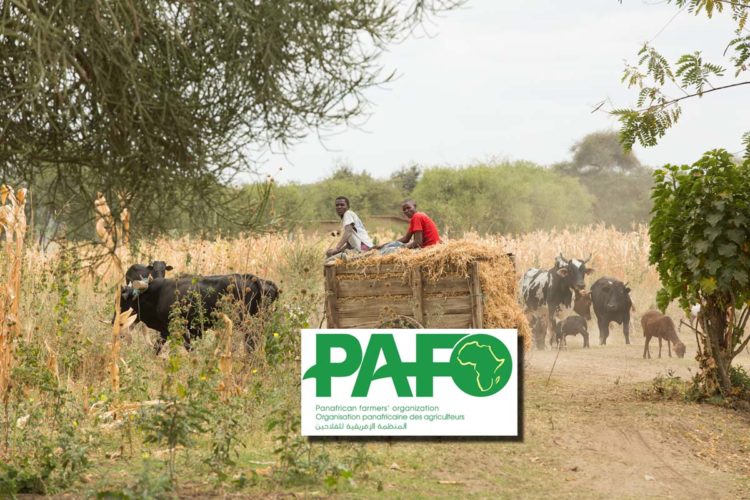There are tens of millions of family farmers across Africa who produce food and feed families and communities. These family farmers cultivate their fields, raise livestock, fish and manage forests and forest products. They all have different skills, needs, interests and opinions. But, they also have common challenges including climate change, the need for training, investment and business networking and now the COVID-19 crisis.
Farmers, pastoralists, forest managers and fishermen from nearly 50 African countries are represented by the Pan African Farmers Organization, known as PAFO. An organization that this year celebrates 10 years of existence, 10 years of advocacy in favor of African Farmers.
PAFO is the voice of tens of millions of African farmers integrated in nearly 70 national organizations, unions, federations, cooperatives, associations, etc., and united in five regional networks operating at the heart of African agriculture. Its five Member networks are: the Eastern African Farmers Federation (EAFF), the Regional Platform of Central African Farmers Organizations (PROPAC), the Network of West African Farmers’ and Producers Organizations (ROPPA), the Southern African Confederation of Agricultural Unions (SACAU) and the Maghreb and North African Union of Farmers (UMNAGRI).
Fatma Ben Rejeb, CEO of PAFO, talks about the only farmers platform on a continental scale in the world. She specifies that the creation of PAFO was very important for advocacy and for making the voices of farmers heard at continental and international levels. But also, PAFO makes it possible to facilitate knowledge management, the exchange of experience, the promotion of the achievements of farmers and their organizations, etc.
“From the beginning, we have tried to unite the farmers of the Continent around common needs, themes and challenges that bring them all together”. Among the common themes: access to land, financing, local markets but also regional and continental trade, public investments in family farming, capacity building of farmers and their organizations, as well. although cross-cutting issues in terms of climate change, the empowerment of rural women and youth, in addition to the main challenge currently: COVID-19.
Ms. Ben Rejeb explains: “We are trying to collect information and bring together the solutions brought by the farmers, through their reflections and their proposals in order to transmit them to policymakers, African institutions, United Nations agencies, international institutions and all technical and financial partners.
Family farmers play an important role in food and nutrition security, but they are vulnerable in this time of crisis, especially when access to markets or inputs is affected and their income may be lower than usual.
Ms. Ben Rejeb adds that one of PAFO’s long-term priorities is support for rural women and youth. It specifies in this sense that it is the most vulnerable who must be supported, but unfortunately, we aren’t seeing many effective policies and strategies to support them. Thus, PAFO works to highlight what rural women and young people are doing themselves and which need to be strengthened and brought to scale.
Now is the time to share the solutions presented by the farmers themselves, as it is the UN Decade of Family Farmers. This decade is one of the main achievements of farmers’ organizations around the world including PAFO, which, through their advocacy and the support of some governments, have succeeded in convincing the United Nations to declare the International Year of Family Farming. in 2014. This year, which recorded important results and succeeded in achieving the objectives assigned to it, encouraged farmers’ organizations to continue their advocacy. The UN has thus decided to devote an entire decade to family farming.
Ms. Ben Rejeb says: our goal is not to be satisfied with the comprehensive plan of action for the Decade. Indeed, it is important that the decade be celebrated at local and national levels. Moreover, it is in this sense that we advocate for the development of regional and, above all, national action plans which represent an opportunity for farmer’s organizations, civil society, governments and private stakeholders to get involved in the development and in shaping priorities and activities for the decade. So, national action plans are currently being developed in several countries and the focus will be on implementing them in the coming years.
Plans that will represent local priorities for developing national agricultural sectors, but an emphasis will also be placed on increasing investments in family farming as well as capacity building, both for farmers themselves and their organizations.
Ms. Ben Rejeb adds: “Our ambition is to transform the agricultural sector in Africa into a factor of sustainable food security and sovereignty.”
For more information about PAFO, go to their website: http://pafo-africa.org/?lang=en
Or contact:
Insaf Boughdiri
Communication Officer
Pan-African Farmers’ Organization
Office (+250) 733202069 / 733202070
WhatsApp (+216) 26702936
Skype Insaf Boughdiri

